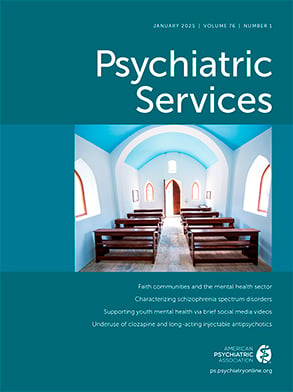To the Editor: In the November 2010 issue, Schmitt and colleagues (
1) reported that the duration of visits increased when depression screening was conducted in primary care. This report is timely given recent recommendations for both adult and pediatric screening for depression in primary care. Schmitt and colleagues examined data representative of more than 641 million primary care visits in 2005–2007 and found that when depression screening was documented in patients' records, physicians' time with patients increased significantly.
I worry, however, that these findings may discourage primary care providers from screening for depression. One variable that may contribute to longer visits, but that was unlikely to have been distinguished in Schmitt and colleagues' data, is the frequency with which primary care providers screen patients for depression. More specifically, the issue is whether screening is universally conducted for all patients or conducted only when the primary care provider feels that it is indicated (that is, if a patient has a history of depression or associated risk factors).
Most depression screening tools used in primary care (for example, the Patient Health Questionnaire-9 and the Beck Depression Inventory-Fast Screen) are very brief and require about one minute to administer, which is significantly less than the categorical difference in visit duration identified by Schmitt and colleagues (
1). In fact, it is not uncommon for patients to complete these instruments before they have direct contact with the physician. If screening is universal, this should not create an undue time burden for physicians.
One means of comparison is to focus on screening for suicidal ideation among patients in primary care, because we know that suicidal symptoms are related to depression but are less frequently endorsed than other symptoms of depression. Using a universal screening approach, Bryan and colleagues (
2) found that 2.1% of adult patients who had been referred to a behavioral health consultant endorsed current suicidal ideation. When screening was specific, indicated, and conducted by the behavioral health consultant, the rate was 12.4%. Different outcomes of screening based on the approach used have also been found for adolescents. Universal screening of an adolescent population found that 3.6% of the sample endorsed suicidal ideation (
3). In contrast, a psychosocial screening project in primary care providers' offices in which providers used the same screening questions and criteria as in the universal screening study above but instead employed an indicated-screening approach found that the suicide risk among adolescents was 17.2%. The results of these studies indicate that when screening is universal, positive endorsement is about five times lower. Given these findings, we may hypothesize that primary care providers who use indicated screening are likely to identify a higher percentage of depressed patients and spend more time with those patients during their visits. In fact, it may not be that the screening process actually added significant time, but rather that the follow-up interview extended the length of the office visit. Thus providers who choose specific patients to screen and complete that process themselves may spend more time with these patients because they are good at identifying patients at risk—perhaps as much as five times greater than if all patients were screened.
Universal screening for depression provides certain advantages over indicated screening. First, fewer patients in need of intervention are identified, thus alleviating some of the anxiety that primary care providers often express about not having time to manage these patients in the primary care setting. A second important advantage is the ability of universal screening to identify patients who are in need of an intervention who may not have been otherwise detected. With an indicated approach, patients without a history of depression or clear depressive symptoms are unlikely to be screened. Because many primary care visits have some psychosocial element involved (
4) and many patients never follow through with behavioral health referrals (
5), it is all the more imperative that providers screen for depression in the primary care setting, where brief interventions may begin. Thus universal depression screening not only provides better care, but the overall process may not create the significant time burden reported (
1).

